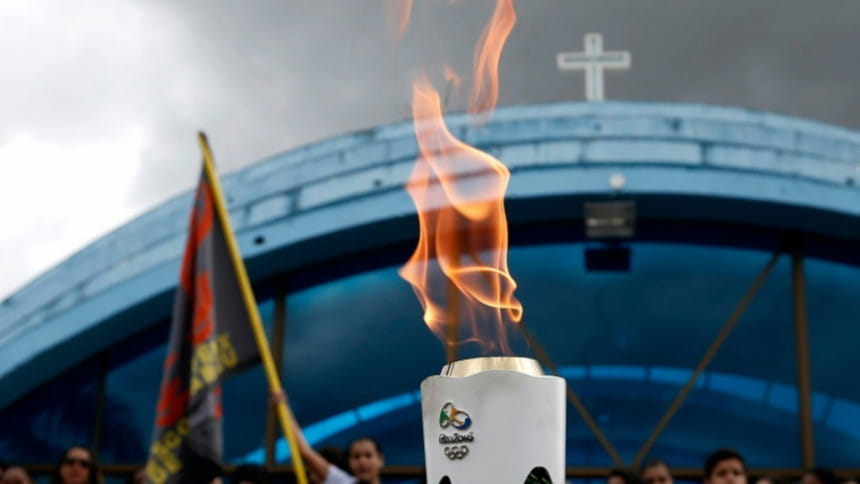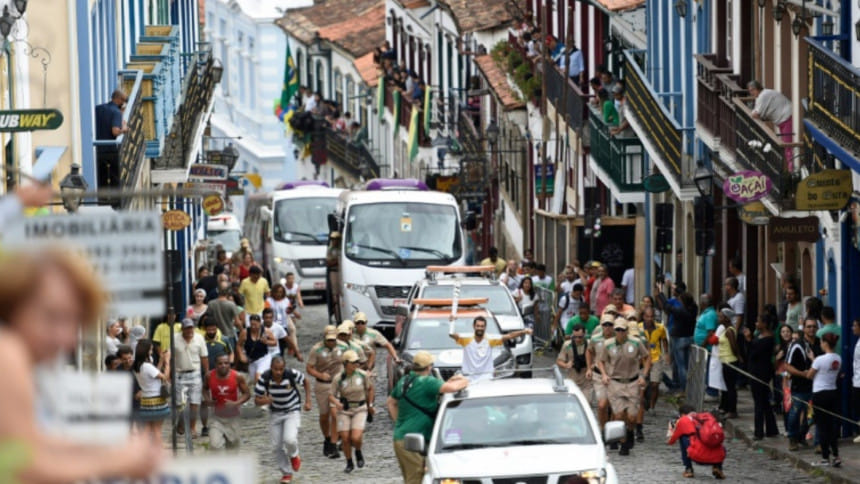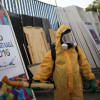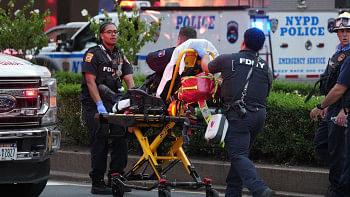Rio artists highlight city's violent underbelly

As Rio de Janeiro prepares to play Olympic host, one art exhibit is flying a less than celebratory five-ring flag portraying five youngsters shot dead by police in this often deadly city.
Part of an exhibit by a dozen artists, the installation denounces police violence against the poor in Brazil's second-biggest metropolis and international tourist attraction.
Far from the image of sun, surf and partying along Rio's Copacabana and Ipanema beaches, the city is plagued by poverty and battles between police and drug gangs, a reality Olympic organizers appear eager to conceal.
Installation artist Wagner Novais hopes the show at the Helio Oiticica cultural center will draw attention to injustices overshadowed in the lead-up to August's Olympics.
"Everything is made up to put on a spectacle, the pageantry of sports," Novais said, "but in real life the state kills its youth. Our voice is suffocated."
To prepare for the exhibition, the artists worked for a month in the Mare favela, a gang-ridden, impoverished complex of slums and working class areas.
"At the moment we are taking advantage of the Olympics and the overselling and overexposure of the city to show the other side," said Eduardo Bonito, manager of the show at Helio Oiticica.
"There are injustices that have been committed because of the games, but there's also injustice that the state regularly commits here in Brazil."
'Provoking empathy'
Novais's Olympic-style five-ring banner refers to an incident last year when police shot dead five youths in a car in another favela called Costa Barros, prompting an unusual public outcry in a city that usually shrugs its shoulders at tales of gun violence in the favelas.
The banner reads: "Rio, Champion of Killing Indigenous, Black, and Poor People for 450 Years." Nearby there are T-shirts with the victims' portraits as well as videos in which the victims' mothers speak about the sons they lost.
A German tourist at the show struggled to hold back tears listening to one of the mothers.
Although crime rates have decreased significantly during the past decade, Rio remains a dangerous city with almost four homicides a day.
Much of the violence is concentrated in favelas and among the poor, with black men the main victims.
The deployment of police units in the favelas leading up to the World Cup in 2014 and now the Olympics has failed to dampen the turmoil.
"I hope to trigger empathy in visitors, to connect with the pain of others," Novais said. "And I also wanted to put a face to this young victim with a T-shirt showing his photo and name, as if it were the body of the young."
'Anti-souvenirs'
The beginning of the exhibit presents objects imagined by the artist Rafucko on the theme "MonstruaRio2016" -- a Portuguese play on the words "to show" and "monster." The work sells "anti-souvenirs" of Rio 2016.
One item "for sale" includes a photo of the Vila Autodromo favela, which was destroyed to allow construction of the Olympic Park in the Barra da Tijuca neighborhood. The image is in the form of a postcard displaying a piece of a wall, akin to Cold War memorabilia sold to tourists after the fall of the Berlin Wall.
Other pieces include a small toy car riddled with bullet holes and a mug portraying a local security officer and soldiers. "Every drink becomes undrinkable," Rafucko says in a video presenting the objects.
The video has gone viral, attracting early controversy that has put pressure on the artist to take down some of his works.
The exhibit opened April 2 and runs through May 21.


 For all latest news, follow The Daily Star's Google News channel.
For all latest news, follow The Daily Star's Google News channel. 






Comments